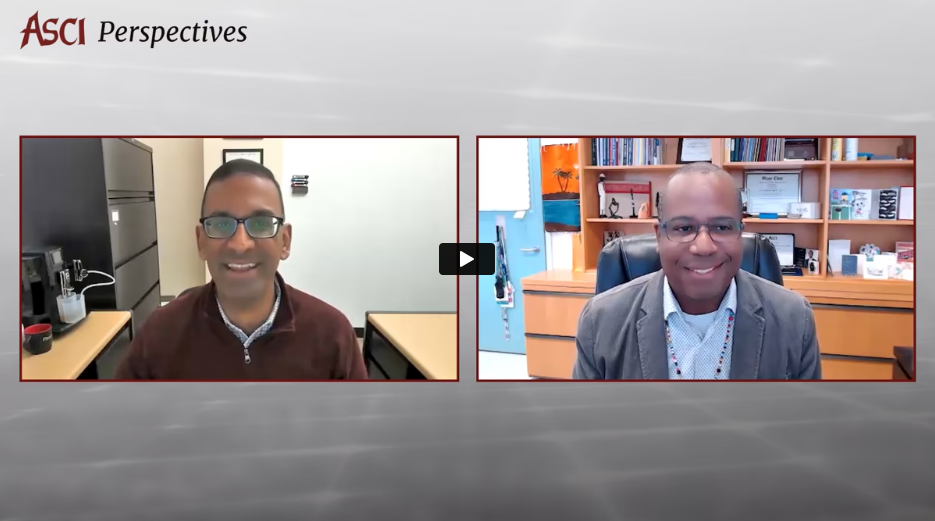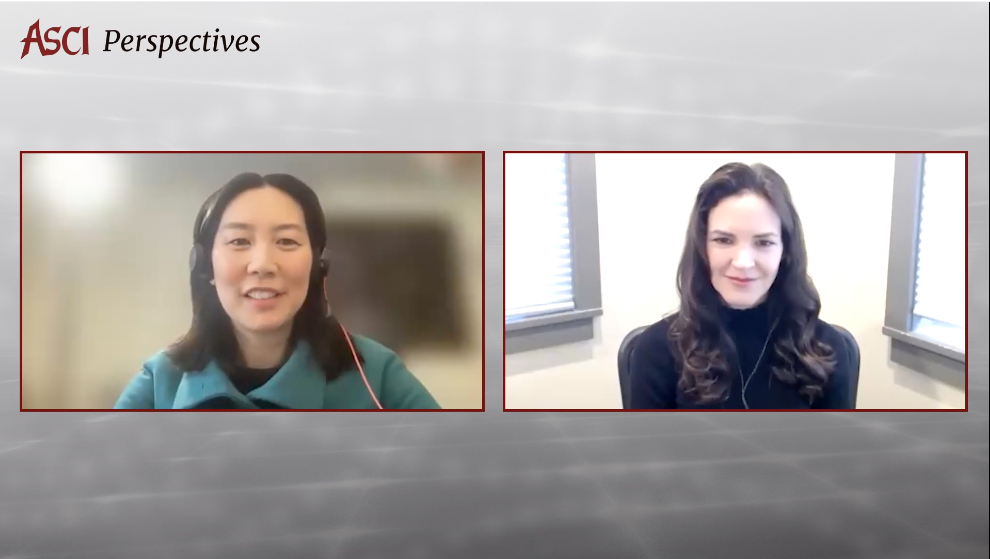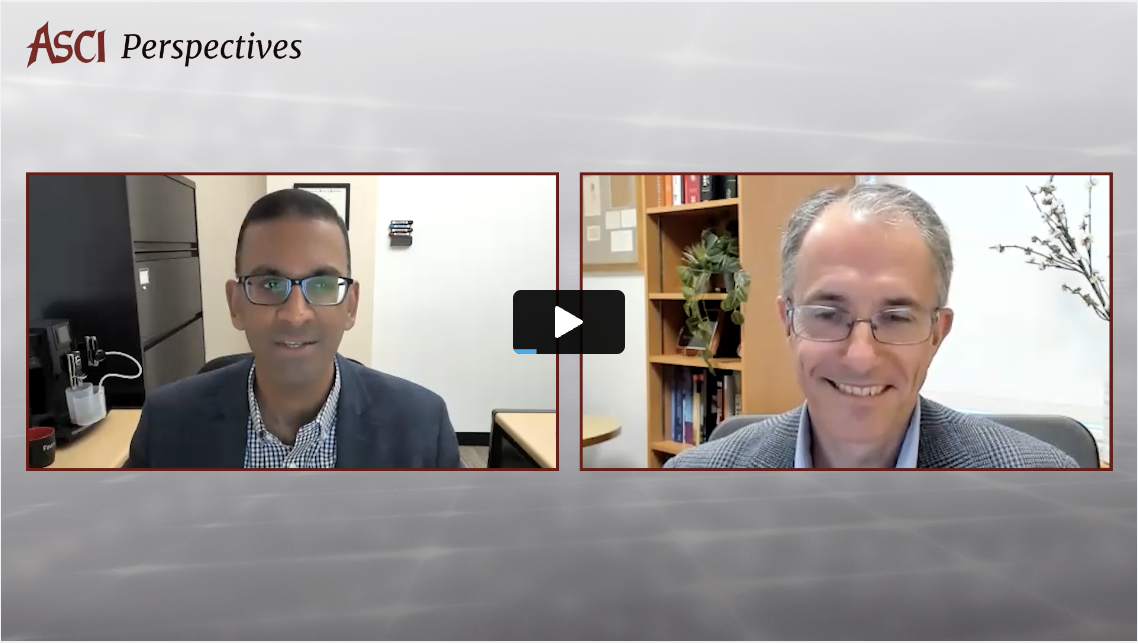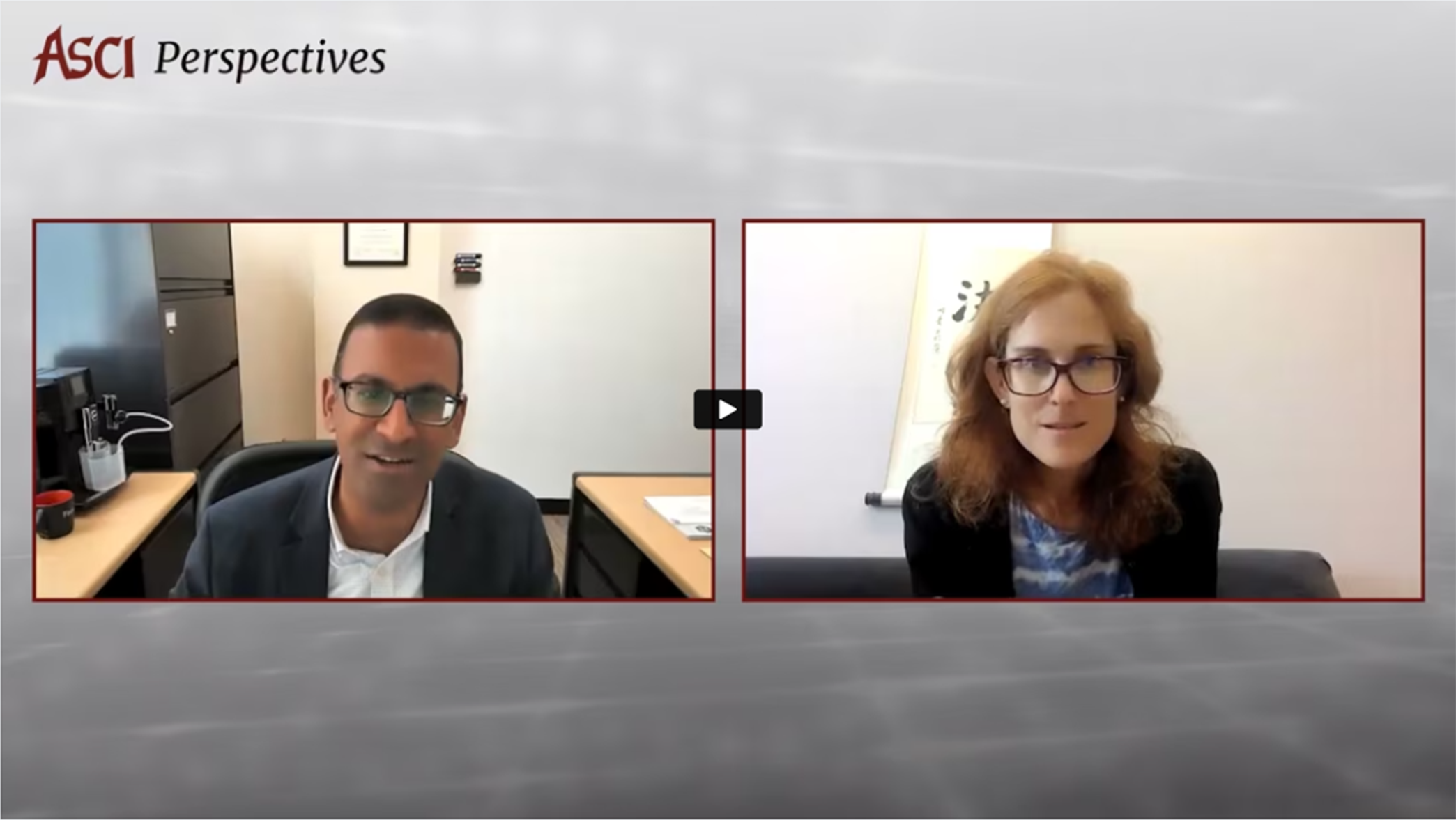Interview with Neil A. Hanchard, MBBS, DPhil, National Human Genome Research Institute, NIH (elected 2022)
Interviewed by Vijay Sankaran, MD, PhD (elected 20218); member, ASCI Physician-Scientist Engagement Committee
Note: The text has been edited for readability by ASCI staff.
Vijay Sankaran: Welcome to this ASCI Perspectives interview. My name is Vijay Sankaran from Boston Children’s Hospital and Harvard Medical School. It is my distinct pleasure to have as today’s guest for our Perspectives interview Dr. Neil Hanchard. Dr. Hanchard is a Senior Investigator at the Center for Precision Health Research at the National Human Genome Research Institute at the National Institutes of Health. He received his medical degree with honors from the University of the West Indies in Kingston, Jamaica, and then completed his Doctor of Philosophy in Human Genetics from the University of Oxford as a Rhodes Scholar. At Oxford, he worked with the late Professor Dominic Kwiatkowski on genetic variation impacting the major histocompatibility complex. He then completed his training in general pediatrics at the Mayo Clinic, followed by a medical genetics fellowship at Baylor College of Medicine. He then started his lab at Baylor for several years before moving to the NIH in 2021.
Dr. Hanchard’s work has helped to define the genetic causes for a range of rare diseases, while also identifying factors that cause variation in more common diseases such as sickle-cell disease. He has received extensive recognition for his work, including being elected to the American Society for Clinical Investigation in 2022. Dr. Hanchard is currently Chair of the Genome Analysis Working Group of the H3Africa Consortium and an NIH Distinguished Scholar. Dr. Hanchard, welcome to this Perspectives interview.
Neil A. Hanchard: It’s an honor to be here.
VS: Well, great to have you. To begin with, I was wondering if you could tell us a bit about yourself, your training path, and what initially got you interested in science and medicine.
NAH: I guess I have a somewhat unusual training path compared to many in that I did my medicine, as you said, in Jamaica, which is where I’m from, which is where I grew up. And following that, I won this Rhodes Scholarship, and the scholarship couldn’t be used to do, say, postgraduate training, which is what I was interested in at that time. And so, they said, “Ycou probably need to do some research.” And I looked around for something that had something to do with pediatrics, and the available project had to do with genetic susceptibility to prematurity. And I was always fascinated by genetics and thought it really interesting. But that was really my first interaction with research at a bench level.
And so that was an opportunity that completely changed the trajectory of where I ended up being, and it was an [was able] to make the most of. And so while in Oxford, I got into genetics and I loved it. It was a great explanation for why things happened and so much more definitive. This was also around the time when the Human Genome Project was finishing. So there was all this incredible excitement about the potential to be able to dissect complex traits and other diseases. And so it was a case of really good timing and an incredible opportunity. And so that’s kind of . . . Once you’ve had the wool taken off of your eyes, you’re like,” Whoa, this is really something incredible that I can participate in.”
VS: Wow. It’s so exciting to hear about how in some ways it was serendipitous, that you encountered genetics in some ways and that took you in a new direction. Could you talk about the impact that mentors have had in your career, in shaping these different transitions, and that have helped you to shape your path as a physician-scientist?
NAH: I think I’ve had the good fortune to interact with a number of really strong mentors who are somewhat atypical in that they’re all physicians and physician-scientists, but they also all had a very clear view of what they wanted to achieve. For instance, Professor Kwiatkowski, who recently passed along, he just wanted to understand malaria and why children got malaria and died from malaria. But what was really insightful for me was the way in which he went about it. He did it with a kind of grace and kindness that, I’ve since learned, discovered, is not something you find everywhere. And so that’s something that I’ve tried to emulate in the way in which I approach my own mentorship of those who are in my lab and those who I interact with as collaborators.
And I had the same thing after I finished my PhD. I’d gone back to Jamaica for a while and worked with Colin McKenzie, who was also a PhD physician-scientist. And he had the same idea and mentality about how we’re doing these things. And then most recently while I was at Baylor, I was mentored by John Belmont, who’s another physician-scientist, again, very focused on thinking about the patients and why we’re doing this and how it is that we can actually improve things in that regard. And I’ll also say that they were the de facto mentor mentors for me as I went through. But along the way, you had the opportunity to interact with others in that sphere who gave you a different perspective and helped you to understand a little bit more about maybe aspects of it that weren’t just pure academics.
So they understood how to network or how to maneuver within academia, and when to press go, when to stop, when to go forward. And those kind of interactions and seeing others in their interactions have been really, really valuable. Some of this came through the H3Africa project that you mentioned that gave me another opportunity to work closely with mentors at Baylor — Chester Brown and Graham Martin — but also to see the other side of the world and learn from researchers who are in very different circumstances and in very different environments. And I think all of those experiences play into my current approach and the way that we’re thinking about problems and approaching them now.
VS: That’s fascinating. It’s really great to hear, and I think something that we often hear from in these interviews is the role that different mentors have had along the way, both formal and informal. And it’s really exciting to hear about how that’s helped you in your own career and in your path. So then moving to your career a bit, you have and you continue to contribute tremendously to advance our understanding of how genetic variation can impact the risk of both common and rare disorders. Could you tell us a little bit more about where you see this research field going broadly in the coming years?
NAH: I think that the primary focus of the last, I don’t know, 10 years or so has really been on the discovery side of things. We’re trying to understand associations and trying to identify genes that are, say, responsible for rare disorders. I think that we’re in this transition period where now we’re trying to understand what those associations mean and how can we pull the causality out of those associations. And part of that has to do with trying to really understand how variation has these impacts. And so that means that we have to understand the in-between of, like, here is a variant and here is a phenotype, and getting a better hold of “This variant changes something in transcription or in translation or in the proteins” and see that whole progression and how that relates to a particular disease outcome or disease trait.
So I think that as we start to understand, particularly for these complex traits, how the noncoding variation impacts regulation and impacts diseases, I think that’s gonna be the current phase in which we’re in to try and really understand. And then the big corner turn is going to be whether we can make this get a way back to the patient. And so I’m really excited, particularly for Mendelian diseases, to see that there is this kind of shift and change where people are now starting to look at like, “How can we actually treat some of these rare disorders?” Now that we have a much better understanding, it’s easier with coding variants or single-gene variants that have a really large effect upon the phenotype. But how can we then translate that into something therapeutic?
And that’s really exciting, because one of the frustrations often is that you’d interact with patients and you’d feel really chuffed. You’re like, “Oh, I’ve discovered the cause of your disorder,” and they would say, “That’s great, but what are you going to do about it?” And so I I’m really buoyed by the idea that we’re perhaps thinking more about getting this back from the bench to the bedside from a therapeutic standpoint, particularly for rare diseases. And that as we get a better handle on how the genome works, we can maybe start to make some inroads in that regard for complex diseases as well.
VS: That’s really fascinating. So in addition, you’ve been a major advocate for the need to increase diversity in genetics research. And I wondered if you could comment a bit on how we can achieve improved diversity in the field of genetics and maybe more generally in biomedical research.
NAH: I think that I’ve been fortunate enough to have the opportunity to interact a lot with folks who are at the forefront of this. And the kind of lessons that they have taught me and that I’m taking away is that we just of have a multipronged approach to this. It’s not just who we study. So diversifying the research cohorts that we interact with, who the references or the individuals that constitute the references for genome variation, for instance — that’s a big part of it. But it’s also who does the studying. So one of the big things about trying to engage communities to be a part of research is that it helps when it’s someone from their community who is doing that research.
And so there is both a community researcher part but then also the researchers themselves. And having this across this entire spectrum that we are mindful of the importance of being diverse in our viewpoint. And I think that one of the keys to that is community engagement. And I think this is where it’s not just true for genetics and genomics, but also across biomedical research; that in order to enact all of this, we’re going to need to have good community engagement — where we’re listening to how communities want to be approached, what’s important to communities, and how it is that we can work together in order to get to a point where the research we do, the medications that we give, all of these things are good for all and not just for a subset of individuals.
VS: So I’d like to change gears a bit. Many of our viewers of the series are likely to be physician-scientist trainees, including those from traditionally underrepresented backgrounds in medicine and science. So I was wondering if you could comment a bit on the lessons you have learned in your own training as a physician-scientist and what advice you might give to trainees who are watching this interview.
NAH: I thought about that, and I’ve given this some thought in the past. I think one of the things that I am acutely aware of as a physician-scientist is sitting in this kind of in-between portion, where on one hand you have scientists and science and then you have the physician and the patients. And there’s a niche group of us who sit in between those two groups. And that gives you a very valuable insight to things because it allows you to have a certain focus about what you’re trying to do and whom you’re trying to do this for. But it also brings a way in which you can actually do that, right? So I think that sitting at that interface is really key, and not to be undervalued.
The flip side of those is that there are challenges, and being in that in- between is that often you don’t necessarily get the recognition that, you don’t have the same viewpoint as, say, a scientist who is working on it. And necessarily, if you’re trying to do two things, you’re not doing quite as much. And on the other hand, you may never be a master physician because you’re trying to sit at that interface. And I think for many physician-scientist trainees whom I’ve spoken to, that dichotomy is something that they have struggled with. And I think what I’ve tried to get across to them is to try and embrace that, because it is still a valuable place to be. And it is the way in which we’re going to get from one to the other. It’s an important place to be in and not to be dissuaded from trying to sit at that interface, although it is admittedly sometimes particularly difficult.
VS: That’s really, really inspiring. And I guess the other question I’d love to follow up on, just related to what we had discussed earlier in this interview was you talked about the role that mentors have had and their generosity. As many of the trainees who might be watching this interview are thinking about “How do I identify mentors or get to know mentors,” I was wondering if you had advice there that could help them as they’re seeking that process.
NAH: I can only speak, I guess, to the kinds of experiences I’ve had. I think I’ve been very fortunate to have mentors who shared very similar ideals, particularly in terms of science and a physician-scientist type of approach to things. And that’s been very helpful for me. So I think finding your people, so to speak, is actually really important. Sometimes that can be at meetings and figuring out which meeting is your meeting, where are your people? And so identifying who your people are, who will be supportive of the work you’re doing or the approaches that you’re taking, and how you go about and think of things is something to put high on the list of consideration. But I also think that being open to being mentored outside of just your immediate supervisor is also really important: thinking about mentors who may not know your work at all, but may have useful insight about how you navigate the academic world and the kinds of decisions that inevitably come down through these kinds of efforts that need to be made, and what are the kind of pros and cons that go into making those decisions. And I found that having some of these people who aren’t my direct supervisors but who are confidants who you can run stuff by actually has been really insightful and helpful. I think the other thing about choosing a mentor is that senior people, who often have the keys to the kingdom, they are often pretty busy. And so it’s important that your mentor can have the time to be able to do this, and some people don’t have the time, and it’s not because they don’t want to, it’s just the practicalities of life.
But it’s also a lesson to not put all your eggs in one basket, right? So if you have a group of mentors whom you’re not necessarily pulling upon an extensive amount of time from one individual, you’re much more likely to get what you need through a group of individuals just because you kind of spread the same effort over many individuals.
VS: Well, this has been an enlightening and fantastic discussion. I was wondering if you could provide some closing thoughts for the audience.
NAH: I think that the things that I am in the middle of now are this idea that, particularly as physician-scientists, we are in a position to enact sea changes where sea changes need to be enacted. And that’s not a position to be taken lightly, but it is something that can be done particularly in terms of some of the diversity efforts that I’ve been involved with, but also in terms of back-to-the-bedside type of activities that, again, I feel are really important. And we are in a position to ensure that that stays as cutting edge as it needs to stay in the sense that we don’t have to do everything the same way that everybody’s been doing it for the last 50 years. But it’s important to know what’s been done for the last 50 years.
But I think there’s just incredible opportunities now, especially with the big data and data sciences that are expanding, to really have a big effect and to enact these kind of big environmental shifts that are needed, to push medicine in general, and for me personally, genomic medicine forward.
VS: Well, thank you so much, Dr. Hanchard. It has truly been outstanding to be able to chat with you today.
NAH: Thank you so much. It’s been wonderful to be here, and I’ve really enjoyed chatting.




